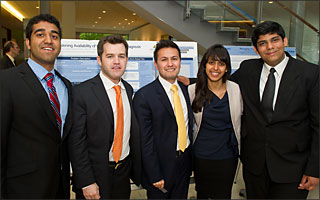Research fellow Anjana Sinha is working to improve the accuracy of tuberculosis testing by designing a slide that can better capture bacteria from a sputum sample.
With a grant, mentoring, and additional support from the Johns Hopkins–Coulter Translational Partnership, her team is moving forward with the logistics of manufacturing and distribution of the product, speeding up the process of bringing the test to the populations that desperately need it.
Since the Coulter partnership was established in the Department of Biomedical Engineering in 2011, it has awarded $1.3 million in grants, helping 12 projects move from concept to commercialization, including three that received awards in both 2012 and 2013, says program Director Youseph Yazdi, who also heads the Center for Bioengineering Innovation & Design (CBID). The Coulter projects have attracted $800,000 in additional funding, he says.
Johns Hopkins is one of 16 universities nationwide to host a Coulter partnership through a program established by the Wallace H. Coulter Foundation in 2005. About 20 projects a year vie for the Johns Hopkins awards, says Yazdi, noting the program provides more than money. “We provide mentorship and support for all projects we fund, and even some we don’t fund, to help them move toward commercial success,” he says.
This support includes helping researchers find outside experts and investors as well as helping them create JHU-Coulter teams. One grant requirement is that each project must be led by two investigators: a clinician who treats patients and a faculty member versed in the technology.
“We’re bridging a gap so that promising ideas by Hopkins faculty and students can be turned into products that save lives, improve health, and reduce costs,” Yazdi says.

